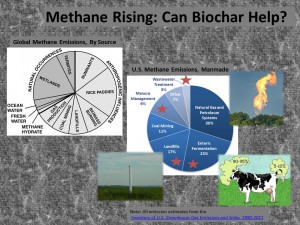Methane (CH4) has been in the news of late. Seems that everything from flatulence to fracking is contributing to the precipitous rise in CH4, which is more than a tad frightening given that it has 34 times the warming potential over 100 years as compared to CO2. The only good news is that methane doesn’t last long in the atmosphere (8 – 12 years) so if we get our act together we could correct the imbalance in the near future.
Mother Nature and mankind both belch out CH4 but the ratio has definitely tilted more heavily towards anthropogenic sources. It seems unlikely that biochar would be able to positively impact Mother Nature’s emissions which largely come from Wet Lands or termites (but who knows, maybe if biochar could somehow be added to the termite diet it could reduce emissions!).
Emissions attributable to we humans is another story – there is LOTS of potential for biochar to allay the methane malaise. As I’ve mentioned in an earlier post, biochar + livestock is a love connection in terms of reducing methane emissions related to ‘enteric fermentation’ (i.e. burps, etc.). While the amount of CH4 produced by livestock varies depending on a number of variables, adding char to feed shows promise in significantly reducing toxic burping.
Landfills, which are the 3rd largest source of manmade CH4 emissions, are also ripe for biochar as a means of abatement. Recent research has shown that certain types of biochar, particularly char with high porosity, small particle size and low ash, can help reduce CH4 emissions. [I’ll dive deeper on that topic in a future post as I think biochar & landfills is a natural combo for many reasons!]
The combination of manure management & biochar is already happening in a number of different ways. Some companies are turning manure directly into biochar. Other research is looking at combining biochar in anaerobic digesters fueled by manure. Still other research has demonstrated that composting manure with biochar can reduce CH4 emissions.
Similar to manure management, wastewater treatment could likely benefit from biochar but I haven’t gone down that path too much as I suspect some of the heavy metals in wastewater treatment could render the biochar unattractive to end users so finding a market for the char could be problematic.
The US doesn’t have lots of Rice Paddies, but these are another source of methane. Though I haven’t come across any research on biochar’s impact on CH4 emissions, the use of biochar in rice fields has been shown to reduce nitrous oxide (N2O), yet another GHG, in rice fields!
Overall, not a bad outlook for using biochar to reduce manmade GHG emissions!


